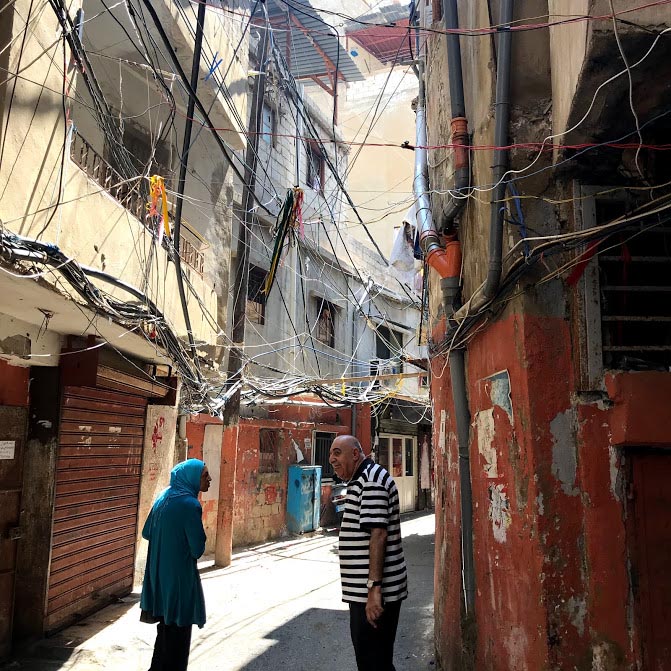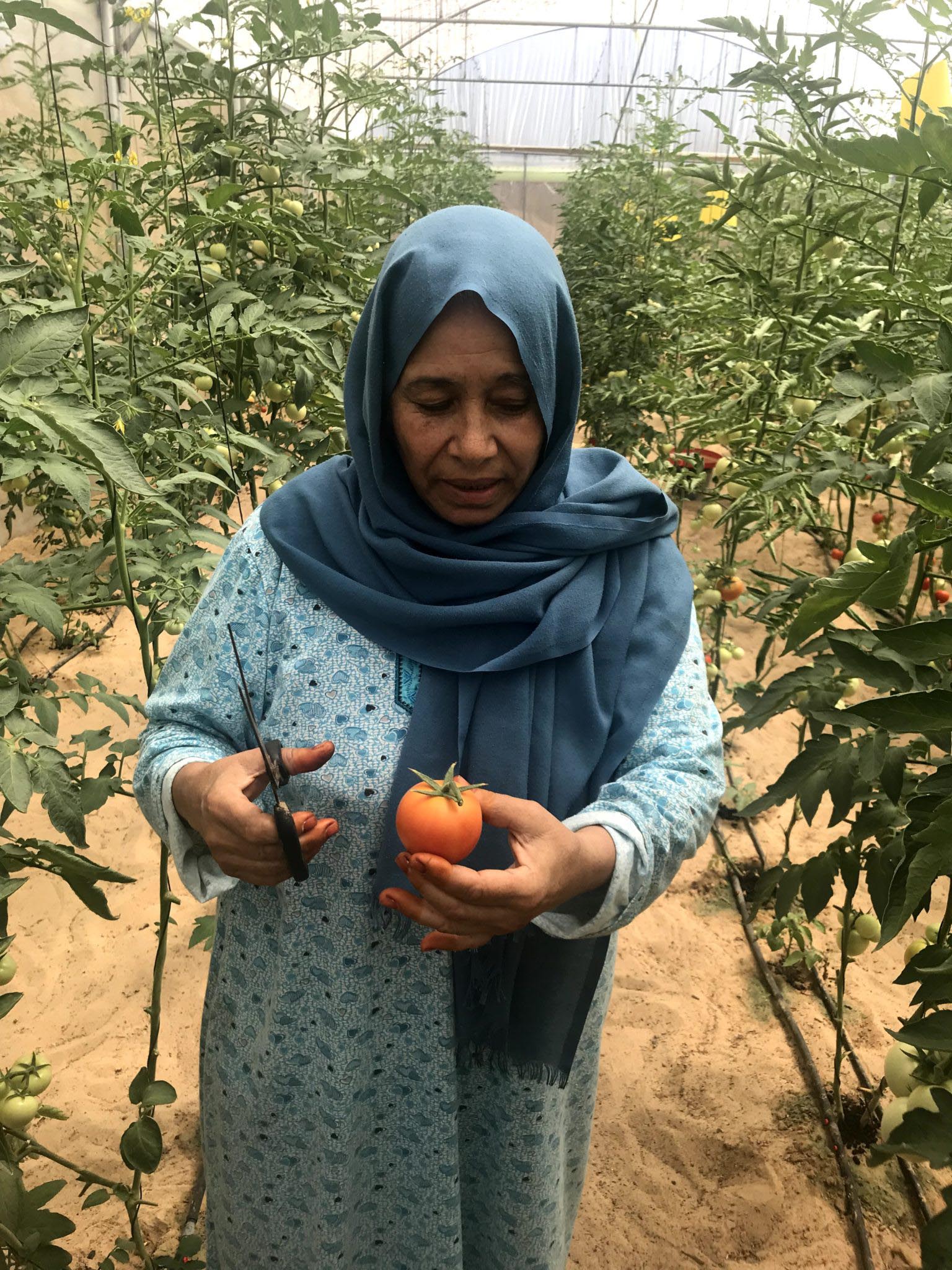Anera’s Impactful Programs in Lebanon, the West Bank and Gaza
Posted in: News
In July 2018, I traveled to Lebanon, Jordan, Jerusalem, the West Bank, and Gaza. I visited 24 current and past Anera projects in Lebanon and Palestine, including eight in Lebanon, six in the West Bank and 10 in Gaza.
This trip came at critical moments in each country. In Lebanon, even as it is still without a new government following May elections, political and economic pressure from most corners of Lebanese society is increasing for the more than one million Syrian refugees to return to Syria. A small number of returns began the week before I was there. The UN, supported by donor nations, believes that conditions are not yet ripe in Syria for significant returns.
In response to the political situation and fluid status of refugees, Anera continues programming, mostly with UN support, working to provide skills to Syrian refugees that will be valuable and valued whether they stay in Lebanon, go home or move to a third country. We are also working increasingly with vulnerable Lebanese host communities. More challenging is our work with Palestinians, as donor cuts to UN agencies mean that those agencies are cutting their funding to implementation partners, including Anera.
On field visits to the Bekaa region and Tripoli and North Lebanon, I saw our work on youth literacy and math, and 14 vocational education courses in nine subject areas. Among the stories I heard from beneficiaries of our voc-ed programs was that of Fatima, a 24 year old Syrian refugee. She took an Anera course on cosmetology and now she has skills that make her “feel like I’ve been doing this for five years.” She’s working freelance, and looking for permanent work.
I also talked with staff and students at Rahma, an Anera local partner serving special needs patients/students. Rahma provides courses in agriculture, graphic design, and catering. Among the stories from Rahma was that of Ahmed al-Sharif, who is a blind Syrian refugee. He completed a course as a medical office administrator and is currently doing a one-month apprenticeship. He is 90 percent certain he’ll get offered a permanent job.


Shatila Camp, Lebanon
On a Saturday morning, I visited Shatila, the Palestinian refugee camp in the middle of Beirut. To walk in Shatila is to navigate damp, wire-crossed, narrow alleyways and housing that claw at the dignity of inhabitants’ beings. The visit to Shatila reminded me that Anera must continue to push to do everything possible for the Palestinian refugees, who were and continue to be our raison d’etre.
We then spent three days in Jordan, visiting Amman and Za’atari Camp. We found strong interest, particularly from the Jordanian Government, in having Anera back in Jordan to help with the Syrian refugee crisis. Beginning with delivering much-needed medicines, we will look to re-establish a presence in Jordan, working with and for Palestinian and Syrian refugees, and, potentially, with vulnerable host communities.
From Amman, I went to Jerusalem, where attention was focused during the month of July, as it had been for the past three months, on drastically deteriorating human conditions in Gaza. The other big, related issue, was what will happen with US government funding for Palestinians. We are deeply concerned about funding cuts, but also know that we are trusted partners of the US government and all our other donors – many of whom are and will step up to meet US funding gaps.
After a day in Jerusalem, I spent a few days in the West Bank. Between 2002-2008, Anera constructed, with private funds, four Information Technology Centers of Excellence in the West Bank. We built the centers to provide world-class facilities and professional training programs responsive to market needs, with the potential to help Palestinians for generations to come. I had exhilarating visits to Al Quds University and Birzeit University. Both universities have put their IT centers to great use. They have expanded their focus and efforts beyond the original buildings and concept to develop programs in academic-job cooperatives, design-thinking labs, and other modern, innovative training and learning.
In late July, I visited Gaza. My first stop, straight from Erez crossing, was a center built by our USAID-funded Palestinian Community Infrastructure Development (PCID) program for autistic children. The center is the Right to Live Society, a non-profit Anera has supported for many years. The building, like every PCID structure I’ve visited, is well-designed and solidly built — beautiful aesthetically and pedagogically.
I went with Ibrahim Nabeel Najjar, our agricultural project coordinator in Gaza, who has done a magnificent job working with household farmers to establish successful small farm plots and backyard greenhouses, to see a woman and her greenhouse.
Zahya Al Mubasher, known as “Um Nader,” hosted us at her home. She is 61 years old, a widow, and responsible for 17 family members – children, grandchildren and siblings. She is fighting cancer, growing tomatoes and providing for her family, all with the same resolve and spirit. Her greenhouse is meticulous, clean, and producing high-quality tomatoes.
Two months after starting her greenhouse with Ibrahim’s help, she just picked her first harvest: three, 20-kilo boxes of plump, red tomatoes. She and Ibrahim expect they’ll harvest more than 60 loads per year, or more than three tons of tomatoes! With this, she will feed her family and has income for other necessities including, what for her is critical, educating her children and grandchildren. Selling her harvests will bring in an estimated $2,200 annually, almost three times annual per capita GDP.


Um Nader with her tomatoes
After showing us how she cuts the tomatoes a little high on the stem, to preserve the produce better, and get a higher price, she invited us to sit down to homemade bread (it’s too expensive to buy at the store or bakery, so she bakes mounds of it every other day), and cheese made from milk bartered from a neighbor. I picked a tomato to go with my homemade and homegrown bread, cheese, olives and hummus. I’ve had a lot of good mezze already in my short time at Anera. I’ll be back for Um Nader’s.
Another project I visited in Gaza is a Ross Foundation-supported training program for preschool teachers on expressive arts and psycho-social support. Gaza’s preschoolers were born during the 2014 Israeli war on Gaza. Expert facilitators work with 54 preschool teachers from 10 schools on how to use expressive arts to provide psycho-social support in their teaching and nurturing of preschoolers.
In the workshop, held at the Atfaluna Society for Deaf Children, a facility supported by Anera since its founding in 1993, a group of teachers worked together on an expressive arts learning Project. The experts will follow-up with the teachers in a few weeks, when school starts up again, and will facilitate a Facebook group for sustained expert and peer support. This is an inexpensive intervention that will have an effective, long-lasting impact. As I was leaving the workshop, one of the teachers held up a mask she had made to express her feelings about the workshop. Gaza needs as many smiles as it can muster.
This was my fifth trip to the region since I started at Anera last year, and the first time I went to all of our program regions in the same trip. I am always energized by spending time with our staff in Palestine and Lebanon and seeing the work we are doing. The commitment of our teams to continually improve upon delivery outcomes was abundantly evident on my field visits and discussions with staff and beneficiaries. The trip re-validated my sense that we are doing excellent, impactful humanitarian and development work.
OUR BLOG
Related
InterAction and 50 Member CEOs, some of whom have organizations that work in Gaza, urge President Biden to take decisive and actionable steps to alleviate the humanitarian crisis in Gaza. Detailed within this letter are specific steps and commitments that…
Edwin Everhart on a musical benefit show for Gaza, and the power of music to sustain protest within communities.
